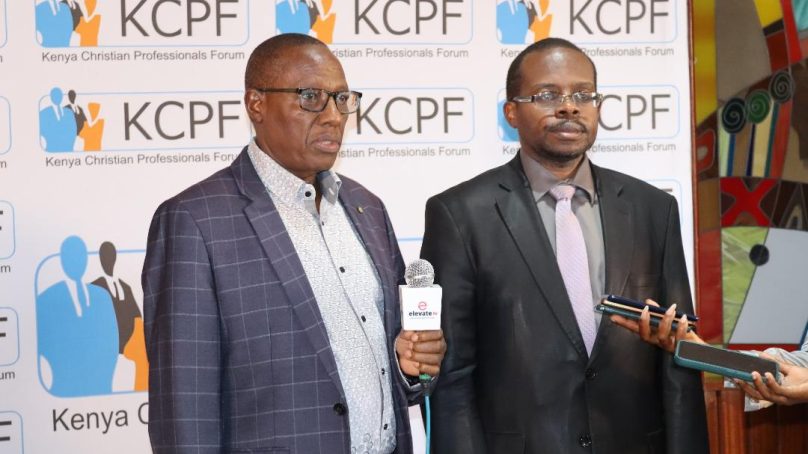
A misalignment between projected revenue and expenditure, unsustainable borrowing in the 2025/2026 financial calls for closer scrutiny given the glaring suspicious allocations that seem conceal budgeted corruption, the Kenya Christian Professionals Forum (KCPF) says.
As a result KCPF wants Kenyans to pay closer attention to the 2025-2026 national budget estimates to eliminate the mismatch.
Speaking during a media briefing held at the All-Saints Cathedral Church on Thursday, KCPF Chairman Charles Kanjama and board member Davis Muchere, a consultant in fraud risk management and a certified fraud examiner, appealed to Kenyan public and parliament to demand accountability and transparency in the budgeting process.
The duo raised serious concerns about the misalignment between projected revenue and expenditure, unsustainable borrowing, and suspicious allocations that may conceal budgeted corruption.
Kanjama, a lawyer, said the forum, under its governance accountability programme, is highlighting the urgent need for civic engagement during the public participation stage of the budget cycle.
“We are here to discuss developments relating to the budgeting cycle. The budget estimates were presented to parliament, and we are the public participation at stage,” Kanjama explained. “We are highlighting to Kenyans the importance of querying the figures, both estimates of revenue and estimates of expenditure as Kenya prepares to finalise its 2025-2026 financial year’s budget.”
The lawyer called for proper financial governance is the foundation of state operations and that failure to address revenue-expenditure inconsistencies will likely worsen governance challenges.
Davis Muchere, a former National Treasury official with years of experience in auditing the budget process, encouraged the government to adhere to the Constitution in the way they handle public finances.
According to Muchere, as of April 30, 2025, the government had borrowed Ksh1.1 trillion, out of which only Ksh190 billion was allocated to development expenditure. The remaining Ksh900 billion, he claimed, is being used for recurrent operations.
“The Constitution requires that revenue must equal expenditure,” Muchere noted. “But currently, we are running the government through borrowing and not for development but for operations. Even when the government says it is allocating Ksh600 billion for a project, in truth it is borrowing that amount, which means it is taxing citizens in advance. Borrowing is simply future taxation.”
Muchere, who has been deeply involved in the budget process, went further to highlight evidence of irregularities in the estimates that suggest imminent misuse of public funds.
He raised red flags on Ksh85 billion allocation under the Ministry of Education’s Basic Education Department labelled “non-financial private enterprises,” which he says it is an ambiguous and untraceable item.
Another questionable allocation he cited was Ksh25 billion under the State Department of Petroleum earmarked for “private financial enterprises,” which he said creates a loophole to siphon public funds to unknown entities.
The two unaccounted for budget items equal to Ksh110 billion in “budgeted corruption.”
Addressing concerns about the tight June 30 deadline for budget approval, the KCPF clarified that the Constitution, under Article 222, allows parliament to approve half the estimates for continuity even if the Appropriation Act is delayed. This, they said, means there is no legal compulsion to rush the process at the expense of scrutiny.
“The Constitution allows time. Parliament can approve half the budget to keep the government running,” said Muchere adding: “So why the rush? Let’s allow Kenyans enough time to interrogate the expenditure.”
Beyond financial issues, KCPF also expressed concern about recent incidents of insecurity, abductions and extrajudicial killings in the country. As a Christian organisation, they called upon state actors to uphold the rule of law.
KCPF confirmed that it had already submitted a petition to the National Assembly several weeks ago but felt compelled to speak out due to the public’s lack of awareness about the full scope of the budgetary process.
The organization emphasized the importance of transparency and accountability in governance, urging citizens to become more engaged in the budgetary discussions that directly affect their lives.
Exchange rate $1 = Ksh129.5
- A Tell Media / KNA report / By Frida Amiani and Kamau Daniel







